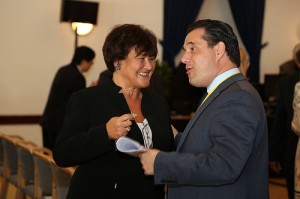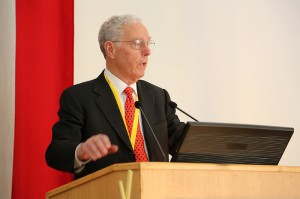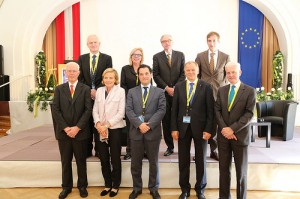EHFG 2013 Opening plenary
By Paul Giepmans, Indre Laurinciukaite, Martina Naschberger and Elena Nicod
Helmut Brand, President of the International Forum Gastein, opened the Forum with a warm welcome to all participants and introduced the main theme of the 16th edition of the European Health Forum Gastein, entitled “Resilient and Innovative Health Systems for Europe”.
Brand presented the three key questions to be addressed during the course of the conference:
- What are the key strategies to make health systems resilient?
- What are the most important innovations to promote health system performance and resilience?
- How can decision-makers best introduce and implement these innovations?
Brand invited all participants to contribute to this debate by filling in an opinion card with their answers to these questions.
Brand introduced the moderator of the high-level debate, Josep Figueras, Director of the European Observatory on Health Systems and Policies, as well as the panel participants: Regional Director of WHO Europe Zsuzsanna Jakab, Director-General of DG SANCO, European Commission Paola Testori Coggi, the Presidency Trio representatives from Ireland, Lithuania and Greece and keynote speaker Uwe E. Reinhardt, James Madison Professor of Political Economy at Princeton University.
Zsuzsanna Jakab highlighted that making health systems more resilient was one of the core pillars of the WHO, and presented WHO activities aimed at enhancing health system resilience. Furthermore, Jakab emphasised that all people must have access to high quality, people-centred care including preventive services and financial protection.
Jakab highlighted the importance of investing in health promotion, diseases prevention and innovations.
Paola Testori Coggi pointed out that health systems must become more resilient to ensure their financial protection against the negative impact of budget-driven reforms. She also emphasised that operationally, they need to remain resilient in order to maintain and improve accessibility and effectiveness of health care. According to Testori Coggi, the main factors which make health systems resilient are efficient funding, solidarity and transparency principles, as well as health workforce planning.
EU-Trio Presidency debate
The EU-Trio Presidency debate was represented by the Deputy Secretary General of the Irish Health Ministry, Fergal Lynch, Health Minister Vytenis Andriukaitis from Lithuania, and Health Minister Adonis Georgiades from Greece. The session highlighted the common priorities on sustainability and health system performance, their resilience, and the focus on public health.
Health is inter-sectoral and we must work together
The main challenges Member States (MS) are facing include the ageing population and the increasing numbers of chronic diseases that need to be addressed differently on one hand, and financial pressures and sustainability on the other. Cooperation and exchange of experiences amongst MS around best practices and implementation of reforms, together with debates around these topics at different meetings such as the European Health Forum Gastein, can only contribute to generating a better understanding of how to improve the efficiency and sustainability of our health systems.
The Lithuanian Minister of Health Vytenis Andriukaitis emphasised that health is a value which should be reflected in all policies and understood from a social, political, cultural, and economic perspective. The healthier the population, the higher the productivity and life expectancy are. Given the importance of health for other sectors, all European Commissioners should consider themselves Health Commissioners. The Minister highlighted an example of success in inter-sectoral collaboration at national level. Cooperation between the Ministries of Health, Transport and External Affairs in Lithuania led to decreasing mortality rates from external causes. He further highlighted the four topics prioritised during the Lithuanian Presidency based on initiatives from the Irish Presidency, which are:
– drafting and adapting the Council conclusions on modern and sustainable health systems,
– reaching an agreement with the European Parliament on the Tobacco Product Directive, following the adoption by the Council of the Directive on the conduct of clinical trials for medicinal products for human use, and
– advancing the revision of the Directive on medical devices and in-vitro diagnostic devices.
It’s time to change and change is good
Adonis Georgiades, Greek Minister of Health, continued the debate around health system reform by sharing the Greek experience. He thanked all the friends of Greece for their solidarity and support, and particularly the WHO, the Troika and MS that provided technical assistance, which have all contributed to the timely and successful implementation of some of the reforms. He compared health system reform to solving a riddle, where funds are less, needs are more, the population is ageing, technology costs more, and budgets are limited. This “new reality” should not be seen as a crisis – as crises come and go – but as something that is here to stay. The sooner we realise this, the sooner we can solve the riddle. He also highlighted the challenges in persuading society of the need to change, and that this change is for the benefit of all and without it, society as a whole will lose.
Some of the successful reforms implemented in Greece are around hospital and pharmaceutical policy contributing to €5 billion in savings. One such measure was the implementation of e-prescribing. Although it was initially negatively received by physicians, its implementation took less than a year and is now used by 98% of physicians. This system now enables the Health Ministry to monitor use and increase transparency around pharmaceutical prescribing. Another main issue in Greece is the very high unemployment rate (27%), where hundreds of thousands of people have lost access to primary care. As hospital care (accident & emergency services) is free to use for all, the burden on hospital services has increased. Therefore the government has implemented a health voucher programme to provide access to primary care services for the unemployed. Since its start this September, more than 25,000 vouchers have been distributed, showing the success of this measure.
Minister Georgiades concluded that one of his priorities during the Presidency will be to share experiences learnt around the Greek health system reform with other MS, and to work together towards finding ways to solve the main challenges being faced today.
Communicate the value of reform and quality of care for all
Deputy Secretary General of the Department of Health of Ireland Fergal Lynch began by showing his appreciation for the positive engagement seen by all three Presidencies around the enormous challenges faced on health systems given the economic difficulties. He underlined that the Irish experience provides a good basis for the discussions about resilience and health systems, given the successful reduction in health expenditures seen, and highlighted four areas where this could be done.
There is a need to focus on efficiency by constantly re-questioning how public money is being spent, and a need to reduce the cost of services to protect the level of services being provided, without unnecessarily slicing budgets. An example of such a measure is the negotiation of work practices with unions that resulted in an increase of the number of hours being worked. The willingness to accept reform, including financial reform and structural reform, by increasing the primary care system, is an important aspect.
Finally, priority has been given to the on-going framework on health and well-being, with a particular focus on childhood obesity and a tobacco-free environment.
His key messages included the importance of a European and common approach in addressing problems, and the sharing of evidence and best practices amongst MS. A shift should be seen in the debate that health expenditures are not a financial burden on MSs’ budgets, but perceiving health expenditures as an investment in a healthy and productive population. In conclusion, the Minister underlined the need to be ambitious about reforms, keeping all stakeholders on board, communicating in clear and simple messages, and never losing site of the need to keep services safe and of high quality.
Primary health care in the centre integrated with the rest of the health system
 WHO/Europe Regional Director Zsuzsanna Jakab emphasised the need to address the social health determinants of health, and obtain a clear political commitment, with the adoption of an inter-sectoral approach in order to respond to health challenges. She also highlighted the need to explain in clear and understandable language the added-value in investing in health given the associated gains to the whole society in order to convince policy makers. She concluded by emphasising the need for a paradigm shift in the health system to address the current challenges of NCDs, accounting for 77% of deaths, by improving the primary care system and integrating public health in a more flexible and people-centred model, with the cooperation of health professionals, in view of a more horizontal system.
WHO/Europe Regional Director Zsuzsanna Jakab emphasised the need to address the social health determinants of health, and obtain a clear political commitment, with the adoption of an inter-sectoral approach in order to respond to health challenges. She also highlighted the need to explain in clear and understandable language the added-value in investing in health given the associated gains to the whole society in order to convince policy makers. She concluded by emphasising the need for a paradigm shift in the health system to address the current challenges of NCDs, accounting for 77% of deaths, by improving the primary care system and integrating public health in a more flexible and people-centred model, with the cooperation of health professionals, in view of a more horizontal system.
Promoting health both as an economic asset and a social asset
Paola Testori Coggi emphasised the role of the EU Semester as a means to economic surveillance and that although it is not popular, it has been set up by the MS based on the Fiscal Compact Treaty to promote macro-economic reform. The Commission advocates towards health as an investment and prerequisite for economic growth, and highlights the need for reform.
Bailing out healthcare through innovation: what can we learn from each other?
Keynote lecture
 Health economist Uwe E. Reinhardt from Princeton University enlightened the audience on what we can learn from each other in terms of new innovations. He highlighted the differences, but even more so the similarities, between Europe and the United States and shed some light from a health economist’s point of view.
Health economist Uwe E. Reinhardt from Princeton University enlightened the audience on what we can learn from each other in terms of new innovations. He highlighted the differences, but even more so the similarities, between Europe and the United States and shed some light from a health economist’s point of view.
In the future, a greater shift should be seen towards the production of health, for which health care is only one of many inputs.
According to him, innovations are needed in order to overcome cumbersome administration, outdated organizational forms and expensive acute care, targeting all these elements that are resource intensive, but to a large extent inefficient. The health system bail-out can be achieved through the simplification of administration processes, more efficient “industrial” processes, and better health management by individuals.
Hence, both evidence-based clinical practice, and evidence-based administrative practice are needed. Further, he suggested the implementation of an integrated delivery of care using the Kaiser model, the enforcement of greater transparency around cost and quality, and he proposed a payment reform – from fee-for-service to payment per case or capitation. Finally, he highlighted the urgent need for innovations encouraging individuals to better manage their own health, including teaching young people how to do this more effectively and efficiently. In order to satisfy any critiques, he underpinned his statements with Einstein’s value theory on health care and illustrated them with a doctored obese picture of Michelangelo’s statue David after having toured the United States upon its return to Italy.
Please look out for the EHFG 2013 conference report.
It will be published in January 2014 on our homepage: www.ehfg.org
Until then follow us:
Twitter
Facebook
Source: This article published with the kind autorisation of EHFG office 12/2013 .
Tip: More up to date educational events dealing with European healthcare can be found online on the Education Database »medicine & health«.

